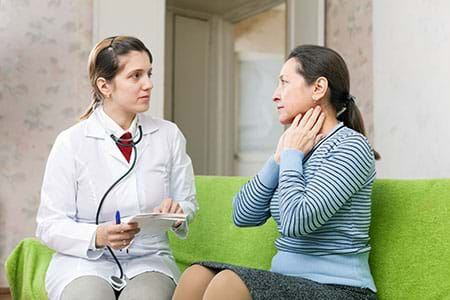Reviewed by Dr. Mary James, ND
Thyroid problems in women are frustrating and hard to pin down because the symptoms often mimic those caused by other health issues. On top of that, thyroid issues can still cause symptoms, even when conventional tests come back normal. Since your thyroid is involved in so many functions throughout your body, it’s important to understand how this gland works, and how easily it can become imbalanced.

Let’s take the top questions we receive about thyroid issues, and answer them one by one.
“Should I get my thyroid checked?”
So many women we work with experience loss of energy and fatigue on a daily basis along with the general feeling that something isn’t right. These symptoms are often the first signs of a thyroid problem though it can be hard to make the connection. Other telltale symptoms include feeling unusually chilly, gaining weight even though you’re eating the same way, and changes to hair or skin.
If these symptoms sound familiar, make an appointment to have your thyroid checked and talk over your concerns with your healthcare provider. If relevant to you, you can talk to your doctor about these other symptoms and contributing factors:
- Feeling sluggishness throughout your system. Low thyroid symptoms can include fatigue, needing extra sleep, constipation, or having cold extremities and core — all result from the sluggishness caused by thyroid imbalance. Even your thinking can feel sluggish.
- Autoimmune disease in your personal or family history. Hashimoto’s disease is the most common cause of thyroid problems in North America, yet most doctors still don’t routinely check for it. Autoimmune diseases (such as Hashimoto’s, celiac disease, and rheumatoid arthritis) often run in multiples, so if you have one — you might have another. Having an autoimmune disease can be a tip-off to the possibility of also having Hashimoto’s.
- Recent stress. Extremely stressful events can trigger thyroid autoimmunity in some women. These include illness, grief, inflammatory disorders, trauma or accidents. This type of stress can also cause adrenal imbalance, which in turn can cause thyroid dysfunction.
“Am I in menopause, or is it my thyroid causing these symptoms?”
We do know that women experience thyroid issues much more often than men. Hypothyroid and menopausal symptoms can seem similar, making it hard to isolate the true source of the problem. Rapidly fluctuating estrogen levels, like those seen during perimenopause and menopause, can trigger thyroid issues in some women. The conversion of thyroid hormone 4 (T4) to the active thyroid hormone 3 (T3) also becomes less efficient in menopause.
If you have symptoms of a thyroid imbalance during midlife, it can make your menopause experience more difficult. As doctors, we need to consider what’s going on in all the different parts of a patient’s hormonal system because of the interconnectedness of endocrine functions. Testing thyroid function is easy to do, and we recommend it if you have hypothyroid-like symptoms, even if you think it’s “just” menopause.
“What does my TSH level mean?”
While it can be hard for women to understand the different levels of thyroid-stimulating hormone (TSH), plenty of practitioners are unsure about them too!
Try this quick screen now.
If your morning basal body temperature range averages around or below 97.5-97.8 degrees F, you may want to be tested for thyroid issues. Here’s how to do a quick-screen:
- Use a basal body thermometer (measuring tenths of a degree).
- Keep the thermometer close to the bed and shaken down the night before, so you can just put it under your armpit first thing.
- If you menstruate, start taking your temperature 2-3 days into your period to avoid testing during the ovulation part of your cycle.
- Repeat for 4-5 days in a row to get an average, since your temperature can occasionally spike.
Still concerned? Take our Thyroid Symptom Quiz.
High TSH suggests low thyroid function. But still, one doctor may call your TSH level “normal,” while another might call it high. I agree with the experts who suggest that a woman’s TSH level should ideally be at 2.5 or below. A TSH level higher than this could signal hypothyroidism and the need for thyroid support. That being said, every woman is different, so many factors — including symptoms — should be considered.
“What if my doctor says my TSH levels are normal but I still have symptoms?”
Every doctor needs to look at more than TSH, but it often doesn’t happen in an initial screening for thyroid health. The thyroid gland produces the hormone T4, which is then converted to triiodothyronine (T3) mostly outside of the thyroid gland. T3 is the most active thyroid hormone, and is the form that predominates inside your cells.
So, for normal thyroid function, you need optimal levels of both T3 and T4, which is only possible when this conversion process is working. Specific testing to determine your T4 and T3 levels, along with TSH, can help confirm this. It can also be useful to check for thyroid antibodies. Work with your healthcare provider as necessary to get this more complete picture of your thyroid function.
“I don’t feel better when I’m taking thyroid medication. What now?”
Although most women with very low thyroid function feel better once they’re on thyroid medication, some will still have symptoms — or feel even worse.
This can happen because some women who are prescribed the usual T4 (as levothyroxine or synthetic Synthroid) aren’t effectively converting T4 into active T3. If your T3 remains low, you’ll continue to have symptoms.
Factors that may interfere with the conversion of T4 to T3 include:
- poor nutrition
- not getting enough selenium
- chronic emotional or physiological stress with high cortisol
- inflammation
- some medications
In addition, if you have a thyroid imbalance and an adrenal imbalance, your thyroid medication alone might not resolve your symptoms — you may also need adrenal support. It’s fairly easy for an imbalance in one hormonal system to affect another.

“What should I do if I don’t want to take thyroid medication?”
I can understand why women don’t want to take prescription medication as their first step. And in mild cases, natural methods alone can often work well, but I still encourage you to get tested periodically.
If you want to try an alternative approach I recommend these first steps:
1. Support your thyroid with targeted nutrients. Some of the nutrients required by the thyroid, or for the conversion of T4 to T3, include: iodine, selenium, zinc, copper, and B vitamins, especially riboflavin, niacin and B6. Herbs such as ashwagandha, Coleus forskohlii and Bacopa monnieri can help your thyroid function better, and may work in your body to provide powerful symptom relief. Getting enough of these nutrients and herbs on a daily basis can gradually and gently boost your thyroid.
2. Aim for eating a blood sugar-balancing diet. Spikes in blood sugar lead to blood sugar crashes and additional hormone imbalances. Eat regular meals and snacks, each with at least some protein in them. Don’t skip meals and don’t let yourself get too hungry. Unstable blood sugar can upset many of the systems in your body.
3. Do something about chronic stress. Ongoing stress that lasts indefinitely has a dire effect on your body, including thyroid function. Even when your mind is used to stress, your body never adapts. Stress is such a common contributor to thyroid and other health problems that addressing it should become one of your top priorities. Identify your stressors to see how they influence how you feel each day. Learn to manage stress by purposefully slowing down. Get as much sleep as possible and push yourself to find engaging regular exercise that feels good. Seek out consistent emotional support and don’t try to do everything on your own.
Lifestyle shifts and nutritional support are thyroid health factors you control. Both can help rebalance your thyroid and relieve symptoms, whether you’re on medication or not. Either way, these natural steps will help support your thyroid and bring you back home to feeling like yourself again. Note: Other health issues and symptoms, such as heart palpitations, weight loss, feeling too hot most of the time, and increased anxiety may be linked to hyperthyroidism, or overactive thyroid.
Hypothyroidism (underactive thyroid). Symptoms. Updated December 1, 2012. Mayo Clinic Web site. https://www.mayoclinic.org/diseases-conditions/hypothyroidism/basics/symptoms/con-20021179. Accessed July 27, 2015.
Westphal SA. Unusual presentations of hypothyroidism. Am J Med Sci. 1997 Nov;314(5):333-337.
Whybrow PC. Behavioral and psychiatric aspects of hypothyrodism. In: Braverman LE, Utiger RD, eds. The Thyroid, 6th ed. Philadephia, PA: J.B. Lippincott Co.; 1991:1078-1083.
Massoudi MS, Meilahn EN, Orchard TJ, et al. Prevalence of thyroid antibodies among healthy middle-aged women. Findings from the thyroid study in healthy women. Ann Epidemiol. 1995 May;5(3):229-233.
Tozzoli R, Sorrentino MC, Bizzaro N. Detecting multiple autoantibodies to diagnose autoimmune co-morbidity (multiple autoimmune syndromes and overlap syndromes): a challenge for the autoimmunologist. Immunol Res. 2013 Jul;56(2-3):425-431.
Brent GA. Environmental exposures and autoimmune thyroid disease. Thyroid. 2010 Jul;20(7):755-761.
Sapolsky RM, Krey LC, McEwen BS. The neuroendocrinology of stress and aging: the glucocorticoid cascade hypothesis. Endocr Rev. 1986 Aug;7(3):284-301.
Christianson A, Murray MT. Hypothyroidism. In: Pizzorno JE, Murray MT, eds. Textbook of Natural Medicine. St. Louis, MO: Churchill Livingstone; 2013.
Schindler AE. Thyroid function and postmenopause. Gynecol Endocrinol. 2003 Feb;17(1):79-85.
Ahmed SA, Hissong BD, Verthelyi D, et al. Gender and risk of autoimmune diseases: possible role of estrogenic compounds. Environ Health Perspect. 1999 Oct;107 Suppl 5:681-686.
Badawy A, State O, Sherief S. Can thyroid dysfunction explicate severe menopausal symptoms? J Obstet Gynaecol. 2007 Jul;27(5):503-505.
Badawy A, State O, Sherief S. Can thyroid dysfunction explicate severe menopausal symptoms? J Obstet Gynaecol. 2007 Jul;27(5):503-505.
Wartofsky L, Dickey RA. The evidence for a narrower thyrotropin reference range is compelling. J Clin Endocrinol Metab. 2005 Sep;90(9):5483-5488.
Chopra IJ. Clinical review 86: Euthyroid sick syndrome: is it a misnomer? J Clin Endocrinol Metab. 1997 Feb;82(2):329-334.
Christianson A, Murray MT. Hypothyroidism. In: Pizzorno JE, Murray MT, eds. Textbook of Natural Medicine. 4th ed. St. Louis, MO: Churchill Livingstone; 2013.
Hechtman L. Clinical Naturopathic Medicine. St. Louis, MO: Churchill Livingstone; 2013.










